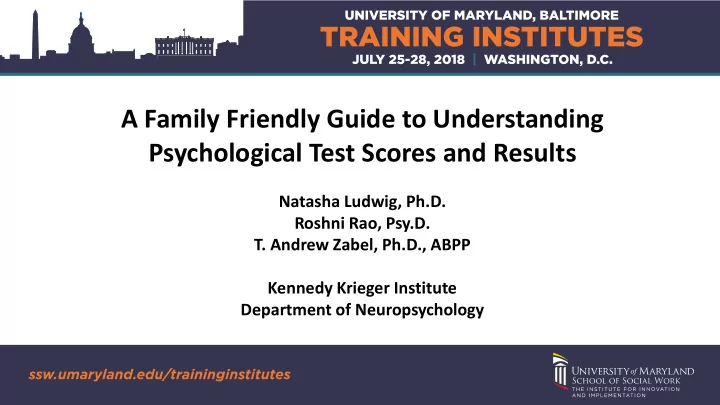

A Family Friendly Guide to Understanding Psychological Test Scores and Results Natasha Ludwig, Ph.D. Roshni Rao, Psy.D. T. Andrew Zabel, Ph.D., ABPP Kennedy Krieger Institute Department of Neuropsychology
• Show us what you know! • Factors that Impact Performance • The Bell Curve • Practice IEP Meeting • Defining Impairment & • Show off what you Strengths learned! • Standardized Scores Over • Resources Time
Kahoot.it
Standard Score: Mean Average=100 100
Scaled Score: Mean Average=10 10
Z-Score: Mean Average=0 0
Percentile: Midpoint=50%ile 50 %ile
T-Score: Mean Average=50 50
Average (“Mean”) Standard 100 Score (IQ) Scaled 10 Score T-Score 50 Z-Score 0
68% Standard Deviations
68% Standard Score: Mean Average=100 Standard Deviation=15
68% Standard Score: Mean Average=100 Standard Deviation=15
68% Scaled Score: Mean Average=10 Standard Deviation=3
68% Z-Score: Mean Average=0 Standard Deviation=1
68% Percentile: Percentile Midpoint=50%ile Standard Deviation=?
68% T-Score: Mean Average=50 Standard Deviation=10
Average Standard (“Mean”) Deviation Standard 100 15 Score (IQ) Scaled 10 3 Score T-Score 50 10 Z-Score 0 1
68% 96%
68% Standard Score: 96% Mean Average=100 70
68% Scaled Score: 96% Mean Average=10 4
68% Z-Score: 96% Mean Average=0 -2
68% Percentile: 96% Midpoint=50%ile 2.3 %ile
68% T-Score: 96% Mean Average=50 30
How do you define strengths and impairments? Absolute: Relative: • 1 standard deviation • 20 standard score below the mean? point discrepancy • 1.5 standard between scores? deviations below the mean? • 2 standard deviations below the mean?
Typical or Unusual?
Standard Score=110 110
Scaled Score=8 8
Z-Score= -2.5 -2.5
Percentile= 75 th %ile 75%ile
T-Score=45 45
Everybody got it? 68% Questions? 96% 99%
Let’s go to an IEP meeting!
WISC-5
Grooved Pegboard
ChAMP
NEPSY-2
Sometimes a high score means there is a problem…
Now you are ready to understand what is going on at an IEP meeting… But there’s a few more things you need to know!
• Important Questions to bring to an IEP meeting or a feedback session – What are my child’s strengths and weaknesses? – What are the diagnoses and how did you get there? – How do these test scores inform recommendations / interventions? – What do these scores mean for my child in the classroom or real world settings? – Do you think this testing is valid / true representation of skills? – How does this compare to previous testing?
What can negatively impact test scores (besides ability…) • History • Medications • Behavior & • Emotional Motivation Functioning • Fatigue • Functional Impairments
100 # Items Correct 100 100 100 6 9 12 15 Age
# Items Correct 75 75 75 75 6 9 12 15 Age
Why do we do psychological assessments? • Getting needs met in • Care coordination school (IEP meetings) • Tracking of skills over • Supports and time accommodations • Document progress • Placements • Monitor for declines • Therapies • To understand strengths • Outside therapies or and weaknesses interventions • How to best learn • Access services • Vocational options
Kinds of Assessments • Psychological • Neuropsychological • Clinical Psychologist • Neuropsychologist • Questions about cognitive skills • Questions about all of these and psychological diagnoses things in children with medical • Educational conditions • School psychologist • Multidisciplinary • Questions about academic skills • Physical Therapy (PT)/ • Psychoeducational Occupational Therapy (OT)/ • Clinical or school psychologist Speech and Language Therapy • Questions about cognitive skills, • Psychiatric psychological diagnoses, and academic skills
• PAR Toolkit app
• National Center for Learning Disabilities (NCLD) Handout – https://www.ncld.org/ – Endrew F. Advocacy Toolkit: https://www.understood.org/en/school- learning/your-childs-rights/basics-about-childs- rights/download-endrew-f-advocacy-toolkit
Kahoot.it
Thank you!!!
WISC-5
Recommend
More recommend